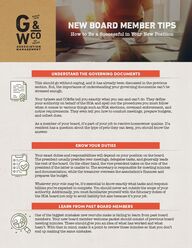
Return to flip book view
UNDERSTAND THE GOVERNING DOCUMENTSThis should go without saying, and it has already been discussed in the previous section. But, the importance of understanding your governing documents can’t be stressed enough.Your bylaws and CC&Rs tell you exactly what you can and can’t do. They define your authority on behalf of the HOA and spell out the procedures you must follow when it comes to various things such as HOA elections, covenant enforcement, and notice requirements. They even tell you how to conduct meetings, prepare budgets, and collect dues.As a member of your board, it’s part of your job to resolve homeowner qualms. If a resident has a question about the type of pets they can keep, you should know the answer.Your exact duties and responsibilities will depend on your position on the board. The president usually presides over meetings, delegates tasks, and generally leads the rest of the board. On the other hand, the vice president takes on the role of the president if the latter is unable to. The secretary is responsible for meeting minutes and documentation, while the treasurer oversees the association’s finances and prepares the budget.Whatever your role may be, it’s essential to know exactly what tasks and responsi-bilities you’re expected to complete. You should never act outside the scope of your authority. Additionally, you must familiarize yourself with thefiduciary duties of the HOA boardnot only to avoid liability but also because it’s your job.LEARN FROM PAST BOARD MEMBERSOne of the biggest mistakes new recruits make is failing to learn from past board members. Yournew board member welcome packet should consist of previous board meeting minutes. These should give you an idea of what has worked and what hasn’t. With that in mind, make it a point to review these minutes so that you don’t end up making the same mistakes.KNOW YOUR DUTIESNE BOR MEBE TISHow to Be a Successful in Your New Position
LOOK OVER YOUR FINANCESPart of your job as a board member, and even more so if you’re the treasurer, is to understand your association’s finances. Review the HOA’s financial statements, reserves, and past budgets. This way, you can make informed decisions based on the fiscal condition of your association.Looking through your financials can be understandably confusing, though. Not everyone has the expertise or experience for it. But, you can always ask for help from other board members or your HOA manager.UNDERSTAND “THE WHY” BEHIND POLICIESFar too often, new board members make the critical mistake of proposing policy and rule changes the moment they assume office. Sure, a lot of homeowners join the board with the express purpose of making changes. But, you should first understand why these existing rules and policies are in place.You might propose a policy change only to find out that homeowners are against it or the association doesn’t have the funds for it. Then, when you look at past minutes, you learn that previous boards also made the same proposal and were met with the same reaction. You can save a lot of time and effort if you analyze past board actions and look into “the why” of things.The same goes for when you want to make drastic changes to the budget or to vendors. When homeowners have gotten used to a certain standard of living, you will naturally encounter some pushback when this standard is threatened.Because board members want to curry favor with residents, they often feel the need to hide the community’s issues in an attempt to avoid delivering bad news. But, homeowners have a right to know what’s going on in the association. As a board member, you should maintain transparency, especially when it comes to the association’s financials.COMMUNICATECommunication is the key to harmonious board proceedings. You should always talk to your fellow board members about community issues. Don’t be afraid to bring up a touchy subject either. Discussions can lead to solutions.Similarly, you must keep homeowners in the loop at all times. Nobody wants to feel left out of the conversation. As such, make homeowners feel included by keeping them informed. It’s worth noting that many state laws and governing documents also establish requirements when it comes to giving out updates and sending out notices.BE TRANSPARENT